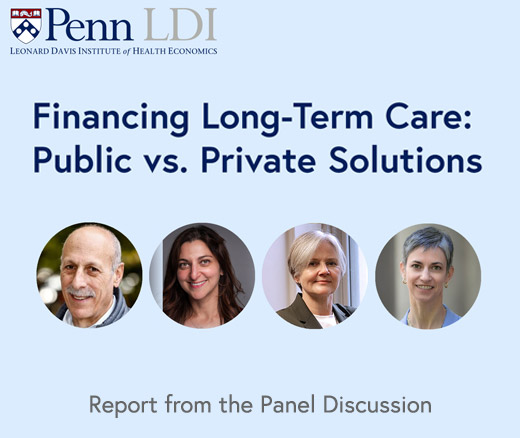
Three Studies by LDI Senior Fellows Win Clinical Research Forum Awards
Chen and Roberts in Top 10, Groeneveld a Top 10 Finalist
Improving Care for Older Adults
News

The One Big Beautiful Bill Act (OBBBA) is projected to cut Medicaid benefits by over $1 trillion. How will these cuts affect long-term care? The law will likely result in worsening quality of care and access to nursing homes and home-based care, said LDI’s Executive Director Rachel M. Werner, speaking on the Make Me Smart podcast with Marketplace’s Kimberly Adams.
Werner said there will also be large differences state-by-state, and the benefits you get may depend on where you live in. So, it’s crucial to plan ahead for long-term care.
Here are eight points from Dr. Werner’s interview on July 16, 2025.
States use taxes on health care providers and insurers to boost their share of Medicaid funding and draw matching federal funds. The new bill limits both existing and new provider taxes, cutting off a major funding pipeline.

The new law will increase by 10 million the number of people without health insurance in 2034, the Congressional Budget Office estimated.
Medicaid is the primary payer for long-term services for older adults and people with disabilities, including nursing home and in-home care. With less funding, quality and access will decline.
Medicaid is required to pay for nursing home care, but home and community-based services are optional. So states are likely to cut these benefits first, reducing options for people who want to live independently at home.
As formal care options shrink, unpaid family caregivers will likely have to fill in the gaps, taking on more emotional, physical, and financial burdens.
Medicaid programs are state-run, and the generosity of care varies across states. With reduced federal funding, wealthier states might fill the funding gap; poorer ones may reduce services—deepening geographic inequality.
Medicaid cuts may drive down pay for already underpaid care workers. Combined with immigration restrictions and delayed nursing home minimum staffing mandates, we could see even more severe shortages in both nursing homes and home care.
Medicare does not cover long-term care, so know your state’s Medicaid rules and start saving early.Medicaid eligibility also varies across states and requires planning. If you don’t qualify for Medicaid, you’ll need personal savings or unpaid family help. Start preparing now to avoid tough choices later.

Chen and Roberts in Top 10, Groeneveld a Top 10 Finalist

How Political Rhetoric and Behind-the-Scenes Deal-Making Obscure Who Really Pays – or How Much

A Wharton–Netter Center Collaboration Uses Experiential Learning to Build a Health Care Workforce Pipeline

The Odd Paradox of the Big Beautiful Bill’s Health Care Goals

Pa.’s New Bipartisan Tax Credit is Designed to be Simple and Refundable – Reflecting Core Points From Penn LDI Researchers Who Briefed State Leaders

A Penn LDI Virtual Panel Looks Ahead at New Possibilities